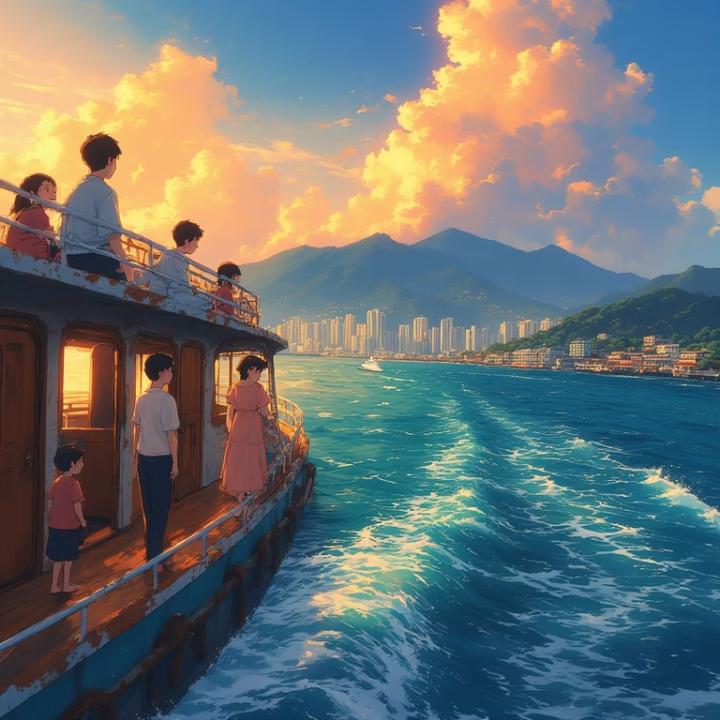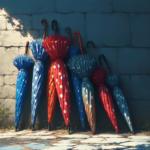
The morning mist clung to the Penang Strait like a reluctant ghost, softening the edges of the city and blurring the line between water and sky. The ferry terminal in Butterworth stood hushed, not with silence, but with memory. The air smelled of brine, diesel, and the faint sweetness of kaya toast from a lone hawker stall that had opened early, just for today.
They arrived together—three generations, one family—walking down the worn concrete ramp as if stepping into a photograph. Ah Leng, her silver hair tucked beneath a faded floral scarf, gripped her husband Ah Tuck’s arm, though she didn’t need it. He walked slower now, his cane tapping gently against the ground, but his eyes were bright, fixed on the vessel moored at the dock.
The Sri Melaka, the last of the old Butterworth ferries, sat low in the water, its green and white paint peeling, its horn silent for the first time in fifty years. A small sign, handwritten and taped to the boarding gate, read: Final Voyage – 8:00 AM.
“It’s really the end,” Ah Leng whispered, more to herself than to anyone.
Her daughter, Nana, adjusted the strap of her camera bag and smiled softly. “We wouldn’t miss it.”
Beside her, ten-year-old Eddy tugged at his school shirt. “Why are we taking the ferry if the bridge is faster?”
Nana ruffled his hair. “Because some things aren’t about speed, sayang. They’re about feeling.”
They boarded with only a handful of others—strangers bound by nostalgia. The deck creaked underfoot. The engine groaned to life, a deep, shuddering breath that vibrated through the soles of their shoes. And then, slowly, the Sri Melaka pulled away from the dock.
Ah Leng closed her eyes as the wind lifted her scarf. She could still feel the ghost of her mother’s hand on her shoulder, the first time they’d crossed together in 1957. She’d been seven, wide-eyed, clutching a paper bag of roasted peanuts. Penang was a dream then—lanterns strung across Armenian Street, trishaws rattling through the morning haze, the scent of clove and cinnamon drifting from open shop doors.
“I remember when this was the only way in,” Ah Tuck said, leaning on the railing. “No bridges, no tunnels. Just this old boat and the faith that it wouldn’t sink.”
Nana laughed. “You used to tell me that every time we came back from holidays in Ipoh.”
“And I meant it,” he said, grinning. “One monsoon, the waves were so high, the cars on deck rocked like toys. Your mother—” he nodded at Ah Leng “—she sang hymns the whole way. Thought it would calm the sea.”
Ah Leng opened her eyes, smiling. “It did.”
Eddy leaned over the edge, watching the water churn behind them. “Did you come on this ferry when you were little, Nenek?”
“I did,” she said. “And your Atuk—he used to come across every Friday to sell mangoes from his brother’s orchard in Permatang Pauh. He’d stand right there,” she pointed, “and wave at me from the dock. I worked at the post office in George Town. We didn’t have phones. Just waves. And mangoes.”
Nana lifted her camera, framing her parents silhouetted against the rising sun. She didn’t take the shot. Some moments were too sacred for lenses.
The skyline of George Town emerged from the haze—colorful shophouses leaning into one another like old friends, the Kek Lok Si pagoda glittering on the hill, the new glass towers rising behind them like sentinels of a different age. The ferry chugged forward, steady despite its age, as if it, too, wanted to savor this final crossing.
Ah Tuck reached into his pocket and pulled out a small, smooth stone—grey, worn by time and tide. “I picked this up the day we got married,” he said, handing it to Eddy. “Right there on the beach near the terminal. We came by ferry. No grand wedding car. Just us, this boat, and a promise.”
Eddy turned the stone over in his palm. “Can I throw it?”
Ah Tuck chuckled. “Not yet. Keep it. When the new ferry terminal opens—the automated one, no captains, no decks—come back. Stand where the old dock was. And toss it then. Let the water remember us.”
The boy nodded solemnly, slipping the stone into his pocket.
Nana watched them, her chest tight. She had spent years chasing the future—studying in Melbourne, working in Singapore, returning only for funerals and festivals. But this—this slow, swaying passage across familiar water—felt like coming home in a way she hadn’t known she needed.
She remembered being small, her father lifting her onto his shoulders so she could see the dolphins that sometimes followed the ferry. She remembered her mother humming Bengawan Solo as they crossed at dusk, the city lights blooming like fireflies on the water. She remembered thinking, even then, that this journey was magic.
Now, the magic was changing. The new transport hub would be sleek, efficient, climate-controlled. No salt on the skin, no wind in the hair. No stories born from the rocking deck.
As the ferry approached George Town, a small crowd had gathered at the dock—locals, historians, a few journalists with notebooks. Someone played an old dondang sayang tune on a portable speaker. A man in a baju Melayu waved a Penang flag.
Ah Leng squeezed Ah Tuck’s hand. “We were lucky,” she said.
“We are,” he corrected.
The gangplank lowered with a metallic clang. The captain—a young man who had only operated this route for two years—stepped out and bowed to the passengers. “Thank you,” he said quietly. “For remembering her.”
They stepped onto the dock together—Ah Leng, Ah Tuck, Nana, Eddy—four footprints marking the end of something that had carried them all.
Behind them, the Sri Melaka sat still, its engine quiet at last.
Eddy looked back. “Will they scrap it?”
“Maybe,” Nana said. “Or maybe it’ll become a museum. Or a floating café.”
He nodded, then reached into his pocket. But he didn’t throw the stone. Not yet.
Instead, he took his grandmother’s hand.
“Tell me again,” he said, “about the mangoes.”
And as the sun rose fully over Penang, painting the strait in gold, Ah Leng began to speak—her voice soft, steady, alive with the past—while the city hummed around them, moving forward, one memory at a time.
The End.
For every farewell is also a whisper of return—
in stories, in stones, in the hearts of those who remember.









